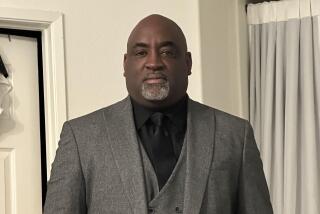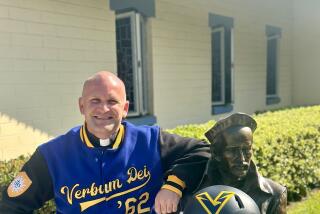Rich or Poor, All Youths Have Potential : Pair of Legal Eagles Took Wing, Found Reward in Inner City
- Share via
Mike: When I finished law school at George Mason University in Virginia, I decided I wanted to do a year’s volunteer work. I originally had hoped to go spend the year at Belize in Central America. But that fell through. Initially I had a job lined up in the criminal courts in Newark, N.J. But that was deferred for a year so I could join the Jesuit Volunteer Corps. Through the application process, I decided I wanted to work in an inner city because that was an experience that I had not had growing up. I never thought I’d come to Los Angeles. I was sort of this jaded Northeasterner, and I thought that California was soft.
Out of the whole program, there was only one high school teaching position, which was something else I wanted to do. I wanted to work with kids about that age. I had taught high school in New Jersey for a year prior to going to law school.
Verbum Dei was very exciting for me because I grew up a big basketball fan, and if you’re a serious fan living on the East Coast, you know about Verbum Dei and all the great teams they’ve had. So I was looking forward to coming out here, and to teach. And I was hoping I’d get a chance to help out with the basketball program. I taught some English classes and coached the junior varsity team during my first year.
There are so many interesting characters at Verbum Dei. I was always struck by the commitment of the faculty when I first arrived at the school. I had visited Los Angeles once before, but I hadn’t made a trip to the Watts Towers and I hadn’t been to South-Central. It was at the height of all the hype about the Bloods and the Crips and the red and the blue. There was so much paranoia. But when I got to the school, I got to know Pete Morado, Ernie Chavez and some of the people who had taught there and they really embraced me. I really enjoyed getting to know these people and to hear the stories about them. Verbum Dei has been a special place for me because of this family atmosphere.
I think in our society, and probably even more so in South-Central, basketball coaches have an inflated role. I think sometimes too much emphasis is placed on successful individual teams and athletes. We’re allowing the kids to build too much of a relationship with the coach. More should be placed with their teachers.
*
Kim: I hope that if a student needed one of us to be something other than a teacher, that they would come to us. I think a teacher is also a role model. The two things go hand in hand.
When I was at Duke, I wasn’t anxious to look for a job. I knew I wanted to go back to school. I decided to try law school because I didn’t have the stomach to be a doctor. I went to Cornell Law School, and by the time I was halfway into it, it was pretty obvious that Mike was going to be in Los Angeles for a while, and that made my decision to move pretty easy. I was a law clerk after my second year at a criminal defense firm in Downtown Los Angeles. I experienced the brighter side of the legal profession working at that firm with terrific attorneys and terrific people. But I couldn’t find my niche in the profession. I wasn’t comfortable. So after we got married, I went back to work at that firm for three months and then told one of the senior partners that I didn’t think it was for me. He was very supportive; he said if you want to try something else, now is the time to do it.
So the principal of Verbum Dei at the time, Robert Mendoza, was kind enough to make a place for me at the school so I could try my hand at teaching. I taught for a semester and I loved it. And I thought I had found my niche.
The (Dolores Mission) parish is very close-knit. I guess it was the end of August, we had to go in for a teacher’s meeting and they wanted us to go across the street for Mass, which turned out to be for the teachers. And there were a lot of people from the community there. And because I was new there, I was really touched by the level of support for the school and the teachers. That made a big impression on me.
*
Mike: It has a very poor parish, and is a very poor school. It’s also in a very rough neighborhood.
*
Kim: But kids are kids and there are a lot of great kids in that school.
*
Mike: There’s also a tremendous sense of community.
*
Kim: The younger kids at the mission love to come to school. They love to come there and see their friends and play and be with their teacher.
But there is something wrong when it’s a real struggle to buy books for kids. I’m looking at science books that are 17 years old.
The mission needs to be heavily subsidized. These schools need massive donations from more affluent schools. I’m thinking there is a whole lot of money out there that’s been misdirected. When you’ve got a community school like Dolores Mission or Verbum Dei who have parents struggling to pay tuition, they should receive help.
*
Mike: I have my class write short papers on subjects like the effect of NAFTA, welfare reform, and what’s going on with society. And I was surprised that I think only one student wrote about the riots. There seemed to be a lot of promises and maybe a lot of good intentions, but I don’t think anybody sees a much different South-Central or Watts today than prior to the rebellion. I think that’s pretty sad. It tends to make people cynical. Teen-agers are famous for knowing everything already, but it just makes them more jaded.
*
Kim: I think maybe the best thing about working around kids, whether they are in the third, ninth or 12th grade, is there’s always room for hope. Sadly, the younger you go the more that is the case. But you see the potential in a kid and you always hope that it’s going to be fulfilled.
I like being with children because otherwise you’re at the end trying to pick up pieces after something’s gone very wrong. Which is not to say that adults cannot change. I just think it’s easier to help children.


